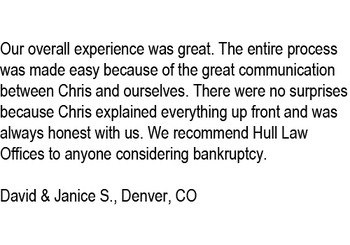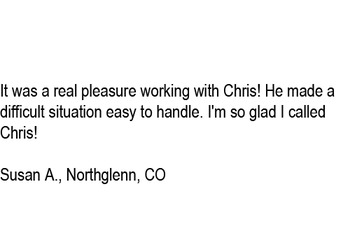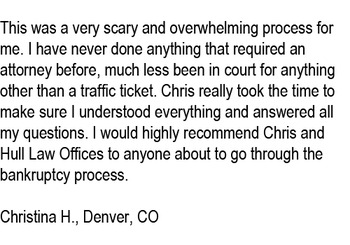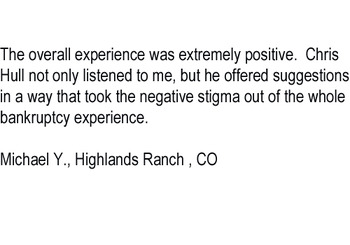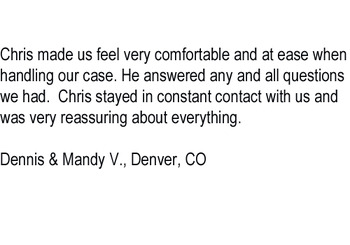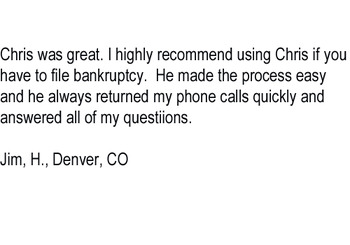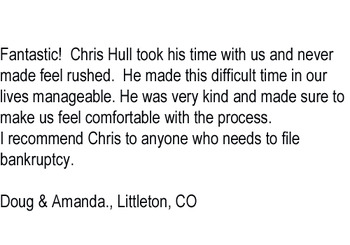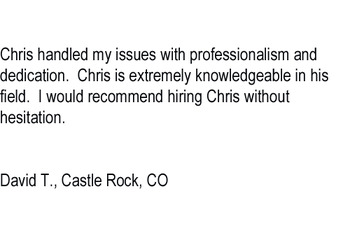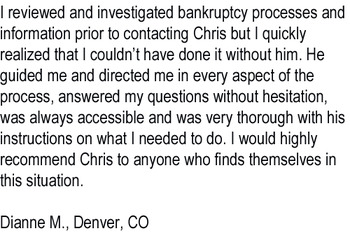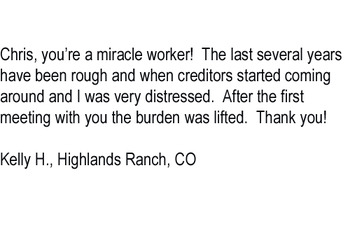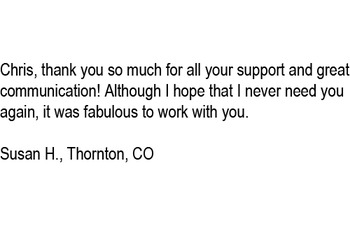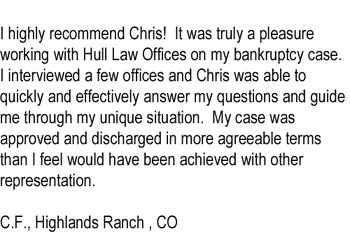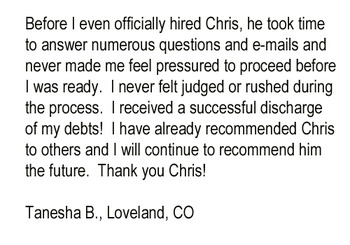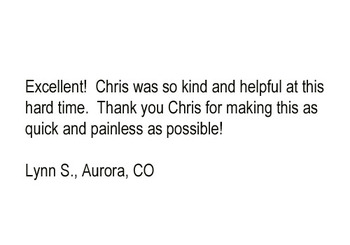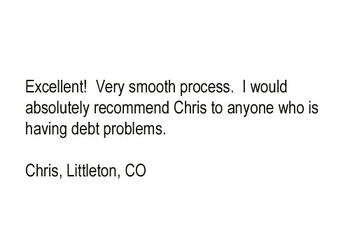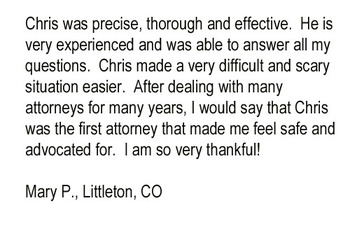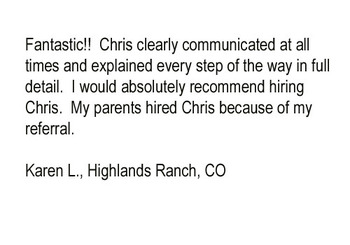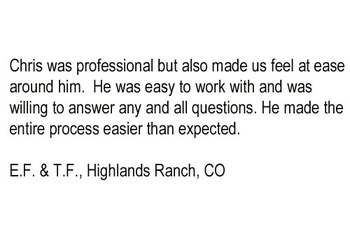Who Files For Bankruptcy?
People file bankruptcy for lots of reasons. Many times the situation was beyond the control of the person who filed for bankruptcy. Sometimes bankruptcy results from the loss of job or medical bills. There are times when situations are dictated by forces you cannot foresee or avoid. Illness or injury resulting in large medical bills, divorce and high credit card debt are also some common reasons. Bankruptcy is a lot more common than many people think. In 2010, 1.53 million Americans filed bankruptcy. For a list of notable people who have filed for bankruptcy, check out the Famous Filers page.
Free Evaluation
Call today for your free evaluation. 720-227-9151. I will meet with you personally, evaluate your unique situation and discuss the options available to best address the challenges you face. The evaluation does not obligate you in any way. Bankruptcy is not always the answer and I will let you know if I think there are better options available.
Can Bankruptcy Help Me?
Bankruptcy may allow you to:
1) Discharge liability for most or all outstanding debts and get a fresh start. When the debt is discharged, the debtor has no further legal obligation to pay it.
2) Stop a home foreclosure action and gain the opportunity to catch up on missed payments.
3) Prevent repossession of a car or other property, or force the creditor to return property even after it has been repossessed.
4) Stop wage garnishment and other debt collection harassment, and get some breathing room.
5) Restore or prevent termination of utility service.
6) Lower the monthly payments on debts, including secured debts such as car loans.
7) Challenge the claims of certain creditors who have committed fraud or who are otherwise seeking to collect more than they are legally entitled to.
Bankruptcy cannot cure every financial problem. It is not possible to:
1) Eliminate certain rights of secured creditors. Although a debtor can force secured creditors to take payments over time in the bankruptcy process, a debtor generally cannot keep the collateral unless the debtor continues to pay the debt.
2) Discharge certain payment obligations identified in the federal bankruptcy statutes for special treatment, such as child support, alimony, some student loans, certain court ordered payments, criminal fines, and some taxes.
3) Protect cosigners. If a relative or friend co-signed a loan which the debtor discharged in bankruptcy, the cosigner may still be obligated to repay the loan.
4) Discharge debts that are incurred after bankruptcy has been filed. This is a very important consideration when determining the timing for filing a bankruptcy petition.
What is Chapter 7?
The most common type of bankruptcy is filed under Chapter 7 of the Bankruptcy Code. A Chapter 7 bankruptcy may make it possible to discharge liability for most or all of the debtor's debt and get a fresh start. A chapter 7 may also stop foreclosure actions, prevent repossession of a car or other property, stop wage garnishment, and restore or prevent termination of utility service.
A debtor may not file a Chapter 7 bankruptcy petition if the he or she has filed one within the previous eight years. Some debts cannot be eliminated by a Chapter 7 Bankruptcy. Student loans, taxes, child support, civil fines are some common exceptions. Although the general rule is that taxes are not dischargeable, income taxes may be discharged under certain circumstances.
Chapter 7 is often called the "fresh start" option because it gives the debtor a fresh financial start by permanently discharging most if not all of his or her debts in a relatively short amount of time. There are several requirements to qualify to file a including satisfying the Means Test.
What is Chapter 13?
Chapter 13 bankruptcy is a repayment plan wherein the Bankruptcy Court approves a reasonable repayment plan which may last up to five years during which time the debtor must make regular installment payments to pay down his or her debt. The most common reasons for filing a Chapter 13 instead of Chapter 7 are: high income; a previous Chapter 7 filing within 8 years; saving a house from foreclosure; debtor has non-exempt assets the debtor wishes to keep.
In order to be approved by the court for a Chapter 13 plan you must be working or have a consistent source of income. Not only must you be able to pay for your monthly living expenses, but you must also be able to make a payment to the court to consolidate your debts.
Famous Filers
Musicians-Marvin Gaye, David Crosby, Tom Petty, Dee Snider, Wayne Newton, Tammy Wynette, Willie Nelson, Cindy Lauper, Ted Nugent, Mindy McCready, Toni Braxton, George Clinton, Andy Gibb
Business People-Donald Trump, Henry Ford, Walt Disney
Athletes-Marion Jones, Joe Louis, Bjorn Borg, Michael Vick, Warren Sapp
Politicians & Military-Abraham Lincoln, Thomas Jefferson, Benedict Arnold, Benjamin Franklin, Uylsses S. Grant
Celebrities & Notables-Larry King, Dorothy Hamill, Zsa Zsa Gabor, Mark Twain, Burt Reynolds, Don Johnson, Oscar Wilde, Sarah Ferguson, Ed McMahon, Tom Sizemore, Red Foxx, Mickey Rooney, Kim Basinger , Daniel Defoe, William C. Durant, Johannes Gutenberg
Helpful Links
Court Approved Credit Counseling Courses
Court Approved Financial Education Courses
Financial Education Certificate
Rebuilding Your Credit After Bankruptcy
Bounce Back Fast After Bankruptcy
Newsweek Article on Bankruptcy
CNN Money Article on Bankruptcy
For a Free Evaluation, Please Fill Out The Form Below

